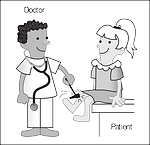G
As a pensioner it’s assumed you’ll be seeing your GP much more often than before. However, this doesn’t mean you should pay them any undue respect or listen to what they say without a healthy degree of scepticism. You should set out your stool on your first visit, when the phrase,
“I’m a tad surprised you’ve suggested that as the likely cause”
is particularly useful – not only to check the confidence they have in their diagnosis, but also to gauge the degree of exasperation and resentment of their reaction.
As a rule of thumb, illness and disease generally fall into four categories:
1. Those that clear up by themselves (approx 65%)
2. Those your GP doesn’t recognise (approx 18%)
3. Those your GP does recognise but can’t do anything about (approx 16%)
4. Those your GP does recognise and can do something useful about (approx 1%)
This is well worth remembering before phoning the surgery because it’s likely that the aggravation of trying to arrange an appointment that doesn’t involve getting up at four in the morning and transporting a carboy of urine through the deserted streets will inevitably bring on a few more unpleasant ailments, some of which may well be terminal.
Any unsolicited invitation from your GP – for advice on stopping smoking, monitoring your blood pressure, inserting fingers into unspecified orifices and the like – should be ignored, while questionnaires should only be completed after at least three months delay and then returned without sufficient postage.
If you’re ever tempted to visit your GP without due reason, simply repeat the following mantra till the condition passes.
“Crippin, Mengele, Shipman …”

